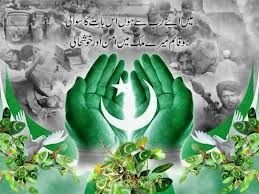Pakistan (![]() i/ˈpækɨstæn/ or
i/ˈpækɨstæn/ or ![]() i/pɑːkiˈstɑːn/; Urdu: پاكستان ALA-LC: PākistānIPA: [pɑːkɪst̪ɑːn] (
i/pɑːkiˈstɑːn/; Urdu: پاكستان ALA-LC: PākistānIPA: [pɑːkɪst̪ɑːn] (![]() )), officially the Islamic Republic of Pakistan (Urdu: اسلامی جمہوریۂ پاكستان ALA-LC: Islāmī Jumhūriyah-yi Pākistān), is a sovereign country in South Asia. With a population exceeding 180 million people, it is the sixth most populouscountry and with an area covering 796,095 km2 (307,374 sq mi), it is the 36th largest country in the world in terms of area. Pakistan has a 1,046-kilometre (650 mi) coastlinealong the Arabian Sea and the Gulf of Oman in the south and is bordered by India to the east, Afghanistan to the west, Iran to the southwest and China in the far northeast. It is separated from Tajikistan by Afghanistan's narrow Wakhan Corridor in the north, and also shares a marine border with Oman.
)), officially the Islamic Republic of Pakistan (Urdu: اسلامی جمہوریۂ پاكستان ALA-LC: Islāmī Jumhūriyah-yi Pākistān), is a sovereign country in South Asia. With a population exceeding 180 million people, it is the sixth most populouscountry and with an area covering 796,095 km2 (307,374 sq mi), it is the 36th largest country in the world in terms of area. Pakistan has a 1,046-kilometre (650 mi) coastlinealong the Arabian Sea and the Gulf of Oman in the south and is bordered by India to the east, Afghanistan to the west, Iran to the southwest and China in the far northeast. It is separated from Tajikistan by Afghanistan's narrow Wakhan Corridor in the north, and also shares a marine border with Oman.
The territory that now constitutes Pakistan was previously home to several ancient cultures, including the Mehrgarh of the Neolithic and the Bronze Age Indus Valley Civilisation, and was later home to kingdoms ruled by people of different faiths and cultures, including Hindus, Indo-Greeks, Muslims, Turco-Mongols, Afghans and Sikhs. The area has been ruled by numerous empires and dynasties, including the IndianMauryan Empire, the Persian Achaemenid Empire, Alexander of Macedonia, the ArabUmayyad Caliphate, the Mongol Empire, the Mughal Empire, the Durrani Empire, theSikh Empire and the British Empire. As a result of the Pakistan Movement led byMuhammad Ali Jinnah and the subcontinent's struggle for independence, Pakistan was created in 1947 as an independent nation for Muslims from the regions in the east and west of Subcontinent where there was a Muslim majority. Initially a dominion, Pakistan adopted a new constitution in 1956, becoming an Islamic republic. A civil war in 1971 resulted in the secession of East Pakistan as the new country of Bangladesh.
Pakistan is a federal parliamentary republic consisting of four provinces and four federal territories. It is an ethnically and linguistically diverse country, with a similar variation in its geography and wildlife. A regional and middle power,[14][15] Pakistan has the seventh largest standing armed forces in the world and is also a nuclear power as well as a declared nuclear-weapons state, being the only nation in the Muslim world, and the second in South Asia, to have that status. It has a semi-industrialised economy with a well-integrated agriculture sector, its economy is the 26th largest in the world in terms of purchasing power and 45th largest in terms of nominal GDP and is also characterized among the emerging and growth-leading economies of the world.
The post-independence history of Pakistan has been characterised by periods of military rule, political instability and conflicts with neighbouring India. The country continues to face challenging problems, including overpopulation, terrorism, poverty, illiteracy,corruption and it ranks among the countries with the most income equality.[16] It ranked 16th on the 2012 Happy Planet Index.[17] It is a member of the United Nations, theCommonwealth of Nations, the Next Eleven Economies, SAARC, ECO, UfC, D8, Cairns Group, Kyoto Protocol, ICCPR, RCD, UNCHR, Group of Eleven, CPFTA, Group of 24, the G20 developing nations, ECOSOC, founding member of the Organization of the Islamic Conference (now the Organisation of Islamic Cooperation), and CERN.[1



